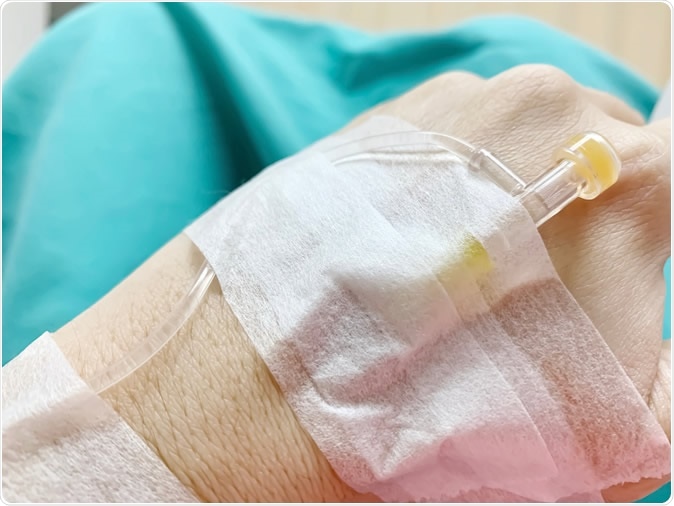NewsColony
Early Heparin therapy improves hypoxia in COVID-19 patients
The systemic use of heparin for treating severe coronavirus disease (COVID-19) showed significant improvements in oxygen exchange and overall clinical presentation of patients, as reported by a study from Brazil available on a preprint server medRxiv.
The COVID-19 pandemic, caused by severe acute respiratory syndrome coronavirus 2 (SARS-CoV-2), is placing a tremendous burden on critical care. Intensive care units have, thus far, based their protocols on previous experiences with influenza and other viral infections.

Study: Heparin therapy improving hypoxia in COVID-19 patients – a case series. Image Credit: DaViDa S / Shutterstock
Coagulation disturbances as a hallmark of COVID-19 disease
Since the inception of the COVID-19 pandemic, the severity of the disease has been associated with markers of coagulation disturbances and independently linked to the development of respiratory failure, hypoxia (low oxygen levels), and death.
Furthermore, it has been consistently demonstrated that SARS-CoV-2 instigates a ‘cytokine storm’ that ultimately results in the activation of the coagulation cascade, causing various thrombotic phenomena and compromising adequate blood supply to many organs in the body.
Unlike typical stiffening of the lung characteristically observed in acute respiratory distress syndrome (ARDS), in COVID-19 patients the severe hypoxemia (i.e. low levels of blood oxygen) is accompanied by near normal pulmonary compliance – most notably in the early stages of the disease.
So far, the literature shows that ventilation-perfusion mismatch as a result of capillary obstruction could be a key feature in the refractory hypoxemia presented by these patients. At the same time, disseminated intravascular coagulation may have a significant role in both hypoxemia and the final outcome.
A retrospective case series
Since the treatment of disseminated intravascular coagulation consists of delaying the coagulation cascade by using low doses of anticoagulants, a group of authors from Sirio-Libanes Hospital in São Paulo and the University of São Paulo Medical School considered adding early heparin treatment to their standard care regimen.
In a recent publication available at the preprint server medRxiv, the authors conducted a retrospective case series of 27 consecutive COVID-19 patients admitted to the Pulmonology service at Sirio-Libanes Hospital treated with heparin in therapeutic doses (tailored to clinical severity).
Furthermore, all patients were given a 10-day treatment with azithromycin, while methylprednisolone was introduced when the condition worsened according to the radiology and laboratory results. If there was a substantial rise in C-reactive protein levels (which is a marker of inflammation), targeted antibiotic therapy was initiated in cases of secondary infection.
Related Stories
The ratio of partial pressure of arterial oxygen to fraction of inspired oxygen (PaO2/FiO2 ratio) was used as a commonly used indicator of lung function in severely ill patients. For many years, physicians and researchers have relied on this measure to characterize the gravity of the ARDS.
Tackling hypercoagulability in COVID-19 patients
A gradual but significant improvement in PaO2/FiO2 ratio was observed during the first three days, and over half of the patients were discharged home within 7.3 days on average.
In addition, half of the patients on mechanical ventilation were extubated within 10.3 days on average. The remaining patients demonstrated progressive improvement without any hemorrhagic complications or deaths.
“Our results suggest the important role of disseminated intravascular coagulation as one of the main mechanisms of organ failure in COIVID-19 and the potential response to early anticoagulation therapy”, explain the study authors led by Dr. Elnara Marcia Negri from Sirio-Libanes Hospital in São Paulo.
“In our opinion, given the marked hypercoagulability seen in these patients – and again in accordance with the autopsy findings – judicious tailoring of heparin doses is needed to prevent capillary reocclusion while avoiding the risks of bleeding complications,” the authors add.
Although this uncontrolled case series does not provide absolute proof of disseminated intravascular coagulation as a cause of respiratory failure in COVID-19 patients, the beneficial effects of the tailored dose heparinization gives valuable insights for both understanding the underlying pathophysiological mechanisms of the disease and treating these gravely ill patients.
Heparin therapy – a one-size-fits-all approach?
The substantial improvement demonstrated in both symptoms and oxygen exchange of COVID-19 patients in response to the anticoagulation approach reveals the potential role of systematic heparin use for the treatment of such patients.
This line of reasoning is corroborated by the increased incidence of thrombotic events in COVID-19 patients, but also similar observations in other recent coronavirus outbreaks. Another layer of proof is thrombi documented in the microvasculature of COVID-19 deceased patients.
“The fact that this is a retrospective study without a control arm does not yet allow us to definitively conclude that heparin in tailored doses should be systematically employed in all COVID19 patients”, caution study authors.
“Nonetheless, our findings in this early group of patients certainly provide food for thought and perhaps a rationale to justify using a readily available and well-known drug such as heparin to ameliorate the dim prognosis of such sick patients while we await the more solid data on this subject that could be provided by a prospective controlled study”, they conclude.
Journal reference:
Negri, E. M. et al. (2020). Heparin therapy improving hypoxia in COVID-19 patients – a case series. medRxiv. doi: https://doi.org/10.1101/2020.04.15.20067017
Source: | Medical News
Source: Sound Health and Lasting Wealth
The post Early Heparin therapy improves hypoxia in COVID-19 patients appeared first on NewsColony.
NewsColony
from WordPress https://ift.tt/2S9YTzz
Comments
Post a Comment